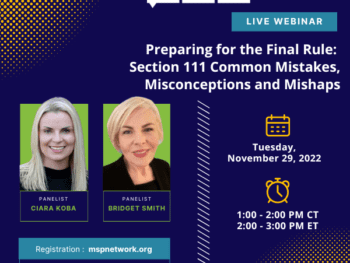Resolving conditional payments remains a challenge for all stakeholders in workers’ compensation cases. This is the result of complex rules and processes that have failed to keep up with the nature of litigation as parties seeking to resolve their cases.
What are Conditional Payments?
Under the Medicare Secondary Payer Act, “conditional payments” occur when Medicare “make(s) payment…with respect to an item or service if a primary plan…has not made or cannot reasonably be expected to make payment with respect to such item or service promptly….” In other words, they arise in instances where a workers’ compensation insurance carrier either has denied primary liability, refuses to make payment based on a legal defense (treatment parameters, reasonableness/necessity, etc.), or Medicare mistakenly makes a payment.
Challenges of Resolving Conditional Payments
Unlike traditional liens for private medical insurance carriers, Medicare is unable to provide parties with the final amount in most instances prior to settlement. The main barrier in resolving conditional payments lies in the slow rate at which health care providers make claims for reimbursement by Medicare. A persistent delay in Medicare processing claims further slows the process. The aging US population is also increasing the pressures on CMS for administering the program.
Conditional Payment Resolution under the SMART Act
The passage of the SMART Act was the first legislative attempt to refine the conditional payment dispute and resolution process. The effort to streamline this process was stymied due to an administrative delay by CMS to issue and implement final rules for conditional payment resolution, which is now effective under Rule 42 C.F.R. 411.39. Under this process, parties are able to obtain a final conditional payment amount after maneuvering through some specific procedures.
Only Medicare beneficiaries are able to take advantage of the current expedited process until implementation of a multi-factored authentication process. This process will likely be completed before January 1, 2016.
Problems with the Resolution Process
Some argue the above process does not mirror the letter and spirit of the SMART Act. While this may very well be the case, other problems arise given the nature of litigation. The problems include:
- Delays in providers submitting bills to Medicare for reimbursement;
- Confusion between “Original” Medicare (Parts A and B) and Medicare Advantage Plans (Parts C and D);
- Changes in review contractor functions and failure for practitioners to keep abreast of changes; and
- Claimants that continue to receive ongoing medical care during settlement negotiations.
Conditional Payment Resolution Best Practices
When dealing with conditional payments, it is important to take back your claim—and monitor the issue on a continual basis. In most instances, even the beneficiary’s attorney is unaware of the frequency their client is receiving medical care and treatment. While Medicare is paying the claims, frequent medical care and treatment, along with unmonitored prescription drug use can be running up significant costs without anyone watching. When Medicare catches up with these payments and asks for reimbursement it can cause major sticker shock. It is in the employer’s best interest to get in front of this process, notify Medicare to stop making these payments, and regain the ability to manage the claim and control costs.
Working with a dedicated service provider is one of the best ways to resolve conditional payments in a timely manner. Stakeholders can also take additional steps to improve their internal best practices and avoid delaying settlement:
- Place the Coordination of Benefits & Recovery Contractor (COB&R) on notice with the correct injury related ICD-9/10 codes;
- Carefully review the Conditional Payment Letter for incorrect/erroneous payments by Medicare;
- Use online tools to identify conditional payments and monitor ongoing medical care and treatment of the claimant; and
- Obtain current forms for conditional payment resolution.
Other Recent Conditional Payment Changes
As part of its effort to implement fully the SMART Act, CMS has recently released a training module related to conditional payment resolution. This new process only involves “applicable plans” who want to appeal a conditional payment determination. This new process includes the following steps:
1.Initial determination (Demand Letter);
2.Redetermination by the contractor issuing Demand Letter;
3.Reconsideration by a Qualified Independent Contractor;
4.Hearing before an Administrative Law Judge (ALJ);
5.Review by the Departmental Appeals Board’s Medicare Appeals Council; and
6.Judicial review in the United States District Court.
Conclusions
Resolving conditional payments in an effective manner requires patience, persistence and perseverance. It also requires an understanding of CMS processes and the ability to work with all stakeholders in an effective manner.
Author Michael B. Stack, Principal, COMPClub, Amaxx Work Comp Solutions. He is an expert in employer communication systems and helps employers reduce their workers comp costs by 20% to 50%. He resides in the Boston area and works as a Qualified Loss Management Program provider working with high experience modification factor companies in the Massachusetts State Risk Pool. He is co-author of the #1 selling book on cost containment, Your Ultimate Guide To Mastering Workers Comp Costs www.reduceyourworkerscomp.com, and Founder of the interactive Workers’ Comp Training platform COMPClub. Contact: mstack@reduceyourworkerscomp.com.
©2015 Amaxx LLC. All rights reserved under International Copyright Law.
SALES TO PAY FOR ACCIDENTS CALCULATOR: http://reduceyourworkerscomp.com/sales-to-pay-for-accidents-calculator/
MODIFIED DUTY CALCULATOR: http://reduceyourworkerscomp.com/transitional-duty-cost-calculators/
WC GROUP: http://www.linkedin.com/groups?homeNewMember=&gid=1922050/
SUBSCRIBE: Workers Comp Resource Center Newsletter
WORKERS’ COMP TRAINING: https://workerscompclub.com
Do not use this information without independent verification. All state laws vary. You should consult with your insurance broker, attorney, or qualified professional.
























